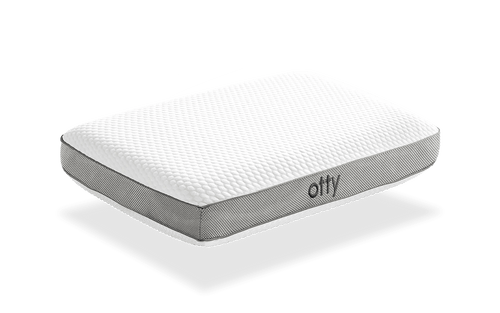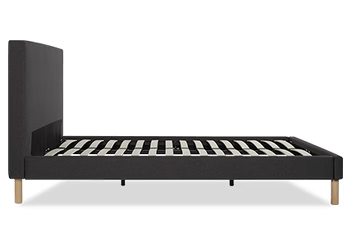There's nothing worse than sleeping on an old, tired and downright uncomfortable mattress. Sometimes it's obvious when a mattress needs replacing; it's falling to pieces, and you just can't get a good night's sleep.
But knowing when to replace your mattress before it gets to that point can be tough. When is the right time to replace? Should you keep a mattress until it's no longer usable, or switch before it loses all quality?
I've advised plenty of customers on this over the years. My mattress guide fills you in on everything you need to know about when you should be changing up your mattress for a newer version.
Table of contents
How long should a mattress last?
The lifespan of a mattress can vary depending on several factors, including the type of mattress, its quality, and how well it's cared for. On average, a mattress should last anywhere from 7 to 10 years, but this timeline can fluctuate.
Memory foam and latex mattresses typically have a shorter lifespan compared to traditional innerspring or hybrid mattresses due to their durable materials and construction.
However, factors such as the frequency of use, body weight, and proper maintenance also play crucial roles in determining a mattress's longevity.
Things which affect the lifespan of a mattress
The lifespan of a mattress is influenced by various factors, and it's hard to pinpoint one thing which will affect your mattresses lifespan more than others.
Good (or Bad) Materials
One of the primary factors impacting mattress longevity is the quality of materials used in its construction. High-quality materials, such as high density foams (like our lovely Hybrid Mattresses) or thicker, taller springs, are more resilient and can withstand years of use without significant deterioration.
How Much You Use It
How often you use a mattress plays a significant role in determining its lifespan.
You'll probably sleep on a personal mattress every night; in a guest room, however, it's probably on being slept on a few times a year.
The more you sleep on it, the quicker it gets worn out.
Body Weight
Body weight also affects how long a mattress lasts. Heavier individuals exert more pressure on the mattress, causing it to compress more quickly over time. A mattress designed to support heavier weights or made with more durable materials may be more suitable for individuals with higher body weight.
Looking After It
Proper maintenance can significantly extend the lifespan of a mattress. Simple tasks like rotating the mattress regularly, using a mattress topper to prevent stains and spills, and ensuring your bed frame offers proper support to the mattress, can help preserve its condition and supportiveness for years to come.
Signs it's time to replace your mattress.
It's hard saying goodbye to something that has supported us (literally) for so many years, but seeing the early signs of mattress deterioration is important to make sure you're not potentially damaging your sleep by keeping it for too long.
Sagging or Indentation
Over time, mattresses can develop sagging or indentations, especially in areas where your body weight is concentrated, regardless of body size or weight.
These depressions can affect the mattress's ability to provide adequate support and comfort, leading to discomfort and disrupted sleep.
Having said that, it's important to note that every memory foam mattress will develop indentations, known in the mattress industry as settlement. This is normal and is not always a sign of a mattress needing replacement.
Visible Wear and Tear
Visible signs of wear and tear, such as frayed edges, worn-out fabric, or protruding springs, indicate that your mattress has reached the end of its lifespan.
These signs not only affect the mattress's appearance but also its structural integrity and performance.
Increased Allergies or Respiratory Issues
An old mattress can become a breeding ground for dust mites, allergens, and other airborne particles that can exacerbate allergies or respiratory issues. If you notice an increase in allergy symptoms or respiratory problems, it may be a sign that your mattress needs to be replaced.
Discomfort or Body Pain
Waking up feeling stiff, sore, or achy may indicate that your mattress is no longer providing adequate support or pressure relief.
As mattresses age, they lose their ability to conform to your body's contours and distribute weight evenly, leading to discomfort and body pain.
Your Mattress Celebrating its 10 Year Birthday
If your mattress has reached the 10-year mark, it's time to throw a party before considering replacing it, even if it still seems comfortable.
Over time, mattresses accumulate wear and tear, and their materials degrade, affecting their ability to provide proper support and comfort.
Additionally, bodily fluids like sweat, get into your mattress and although some will evaporate, some stay and become breeding grounds for bacteria.
How often should I change my mattress?
We recommend changing your mattress at least once every 10 years. Even if your mattress still feels and looks good, it is likely that it has already become a breeding ground for bacteria which will affect your sleep and your health.
When to consider replacing your mattress early.
While mattresses typically have a lifespan of around 7 to 10 years, there are instances when it's prudent to consider replacing yours earlier. Here are some scenarios to watch out for:
Health Considerations
If you experience persistent allergies, respiratory issues, or back pain that can be attributed to your mattress, it may be time for an early replacement.
Old mattresses can harbor dust mites, mold, and other allergens that exacerbate respiratory conditions, while worn-out or unsupportive mattresses can contribute to back pain and discomfort.
Changes in Sleep Quality
If you notice a significant decline in your sleep quality, such as difficulty falling asleep, frequent waking during the night, or waking up feeling unrested, your mattress could be to blame.
Changes in your sleep patterns or an increase in sleep disturbances may indicate that your mattress is no longer providing adequate support or comfort.
Poor Quality or Deterioration
Visible signs of poor quality or deterioration, such as sagging, indentations, lumps, or protruding springs, are clear indicators that your mattress is nearing the end of its lifespan.
If your mattress shows signs of premature wear and tear despite being relatively new, it may be wise to replace it early to avoid further discomfort and sleep disruptions.
Investing in a New Mattress
Considering a new mattress is an important decision for your sleep quality and overall well-being. We've been advising people on the purchase of a new mattress for years, so here are some of things we ask people to keep in mind.
Budget
Determine a realistic budget for your new mattress based on its quality, materials, and features.
While it's tempting to opt for the cheapest option, investing in a high-quality mattress can have long-term benefits for your sleep and health, and will often last much longer than a cheaper option, saving you money in the long run.
Comfort Level
Think about a time when you slept like a log - was it while visiting your friends, or staying in a hotel?
Aside from the obvious effects that a holiday will have on your sleep, it's important to understand whether it is the get-away-from-it-all, or actually a comfortable mattress that's helping you sleep.
Whether you prefer softer or firmer mattresses, make sure to bear that in mind when looking for a new one.
Summary & Key Takeaways
Regularly assess your mattress for wear and tear and make sure that it is still offering you sufficient support and comfort
If your life circumstances have changed significantly since your last mattress purchase, reconsider whether it is worthwhile changing your mattress to suit you now
Put a reminder in your calendar for 8-10 years time when you purchase your mattress. Seriously. We've spoken to many people who still use mattresses from their childhood, 15+ years ago
When searching for a new mattress, consider the cost over the next 10 years. It's often better to spend a little more for the product to last you and work better for you, than have to replace it 2 years later
If you notice any signs such as sagging, visible wear and tear, and changes in sleep quality, it might be time to replace your mattress
The benefits of a good sleep cannot be overlooked. Good, consistent sleep will benefit your life in every other aspect. If you're not sleeping well, do something to improve it as soon as possible










